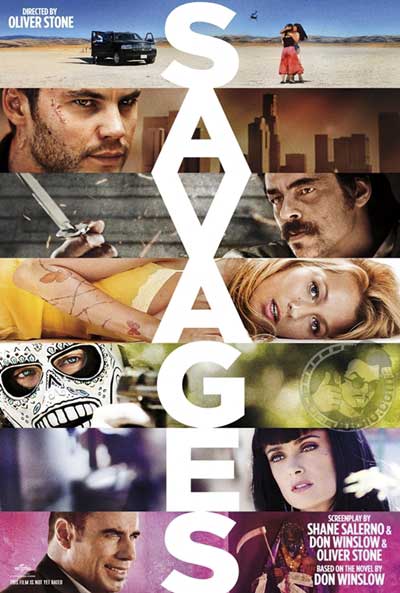
Savages. Good job of Oliver Stone in a key that misleads and risk crazy. Best: antagonists.
Care for Savages and surprise comes with double reading. Not what may at first appear.
Oliver Stone’s return to the big screen is always an interesting proposition. This time that interest is reinforced because the film adapts a novel by Don Winslow, author of detective fiction that stands among his generation for his epic treatment of the genre. His novel The power of the dog, is one of the best that have been published in recent years on drug trafficking and border problems in Mexico and the United States. Winslow’s narrative, with its mix of epic history of criminal organizations, such The Godfather by Mario Puzo and Francis Coppola, the cutting elements of the book more informative reportage and violence kind of Sam Peckinpah The Wild Bunch, all wrapped in echoes of Under the Volcano, Malcolm Lowry, offers numerous points of contact with the films of Oliver Stone. Hence the interest to see how the alliance was both onscreen. Too bad you have chosen to adapt Savages, which I think is a minor work compared to The power of the dog, more conducive to forms of Stone as director.
The director does his job with the talent that we know him, but runs the risk of confusing the viewers developing a film that supports two readings. In a cursory reading makes us believe that his talent is wasted telling the story of the trio, implausible and uninteresting: O (Blake Lively), Chon (Taylor Kitsch) and Ben (Aaron Taylor-Johnson). As acknowledged by the script are like a surfer version and low in calories of the protagonists of Butch Cassidy and the Sundance Kid (George Roy Hill, 1969). Possibly if Stone had chosen as a reference to develop this trio Jules et Jim, Francois Truffaut, would have gone something more interesting, but it is not the case, or rather, he has chosen another way to pull more risky.
O, Ophelia, is the narrator of the story, a voice that is voluntarily pretentious. What tells us about his emotional trio with two male leads is a candid annoying and inconsistent with the situation in which he lives. Morbid sleep seems a little rich girl Barbie does not know what to do with his life. Stone takes the risk of letting that reflect the nature of the character, the tone of candor and ingenuity tiresome, relocating to the soul of his own for much of the film footage.
It is a serious risk that some viewers can disconnect from the plot, enervated by the stupidity of the little rich girl.
So far we can conclude that Savages is a failed project. But it’s actually one of the bravest films of Stone. Precisely because he plays with the labels of commercial cinema and evasion of our time and the dynamite from within rather than from outside, as it did in Natural born killers (1994) and U-Turn (1997).
One line of dialogue Salma Hayek’s character gives a possible clue to what may have been the intention of Stone. The drug godmother played by Hayek tells O, the push and careless brat, is not hearing about anything: the fact that her two lovers love each other more than they love her. Then we have this double end that is in line with the most baffling outbursts of the films of Oliver Stone and can be regarded as an eccentricity great as a crazy resignation to close his fable either direction. Clint Eastwood applied a formula similar to Hereafter (2010). Both ends are a game with the viewer. The Eastwood was a resource to live on your inclination denouement as director while reflecting the inclination of many viewers for the happy ending, more closed. For the final double Savages, Oliver Stone seems to want his fable initialed by the way of the absurd, and revealing his true nature: a farce.
This is how the film takes us to another translation, according to which everything that is told is a farce from the beginning, the voiceover tiresome push Barbie Ophelia is a hint, not a defect or error building history. We are in an area closer to the director’s craziest proposals in Natural born killers (1994) and U-Turn (1997). Except this time the practice of slapping the viewer is more risky than those, because, as I explained above, is from a formula that initially may seem completely accommodated to the clichés and conventions of action movies and more criminal standard of our days.
Oliver Stone plays with the audience, but does not deceive us. The clues are there and we, like Ophelia, who chose to be deceived into thinking we are in a more conventional plot. However, the director continues to provide clues in another sense, handing dark light brushstrokes in the plot. The first is the tone with which the computer Chon and Ben receive messages from representatives of Mexican drug cartel that wants to absorb its business: the catchy tune of the Mexican series El Chavo comedy starring comedian Chespirito. Or that other «Stone moment» one hundred percent in the sequence in which the characters are followed by a police car at night and in the line of many other characters in the director’s filmography, look into the abyss, to about to cross the line and become murderers.
What happens is that the viewer can not be attracted to this game revelation of the farce that proposes Oliver Stone. Maybe that kind of show of defiance against the more conventional and predictable film by way of the argument transvestism even bothers. Or maybe you think, as this writer, that game is less interesting than it could have achieved Stone applying their talents in a foreign key to type experiments Natural Born Killers or U-turn, and more along the lines of his masterpieces, Platoon and JFK. Especially considering that the most interesting thing in Savages is their antagonists: Mexican criminals played by Elena (Salma Hayek) and Lado (Benicio del Toro). They are the real engine of the plot. They, not the game of the argument farce, are the highlight of the film, both the work of these two actors as the situations in which they operate and the dilemmas they face. The part of the argument is starring Lado and Elena is what keeps us hooked on Savages from start to finish … and unfortunately it is the ultimate betrayal with that crazy double end in which Stone revealing just why the character of Dennis, the federal agent played by John Travolta, is apparently so wasted during the rest of the argument: to achieve that fleeting but powerful role in the end.
Oliver Stone Savages best of sacrifices, the villains, and the interesting character of Travolta, in order to reach that final double farce, and that is something that many viewers can not forgive. They may even feel cheated. So Savages is a brave film, a risky proposition, but it can be a bittersweet experience for viewers less willing to enter the game’s director.
Juan Miguel Payan
COMMENTS USING FACEBOOK ACCOUNT



 Pack Top Gun 2 películas Top Gun: ídolos del aire + Top Gun: Maverick (DVD)
Pack Top Gun 2 películas Top Gun: ídolos del aire + Top Gun: Maverick (DVD) 
